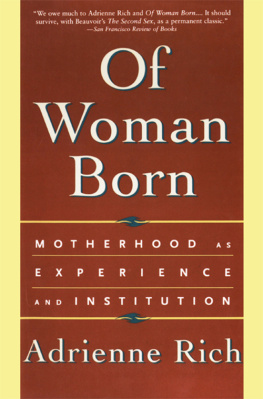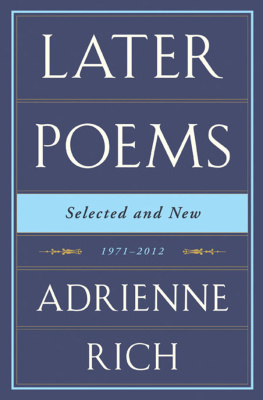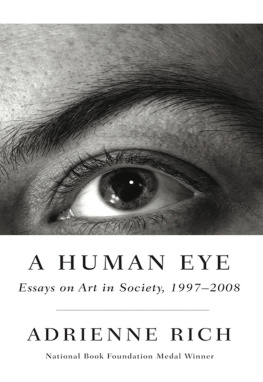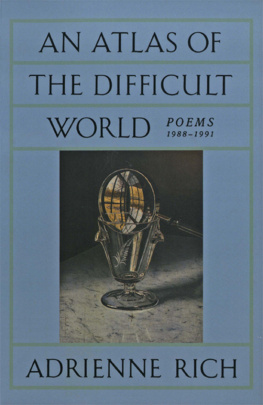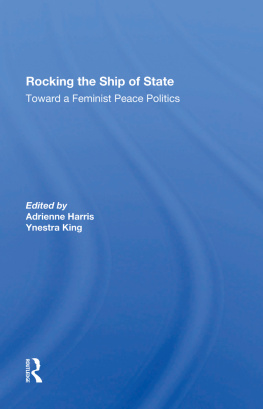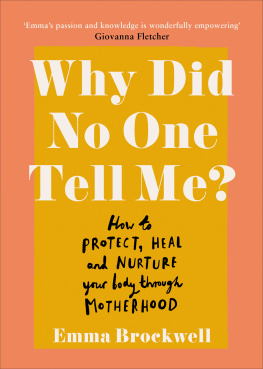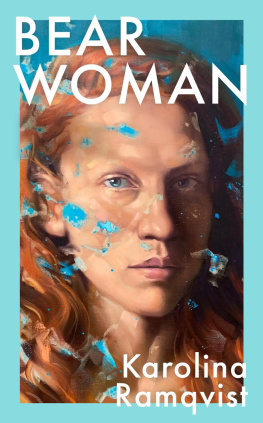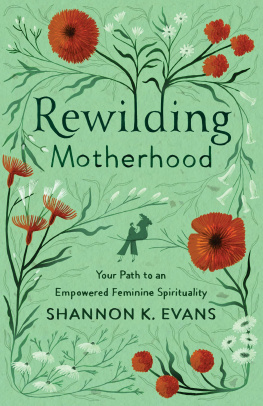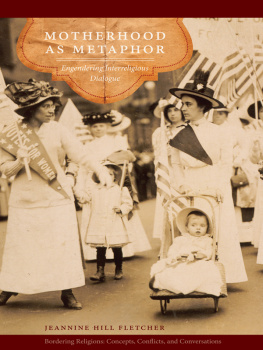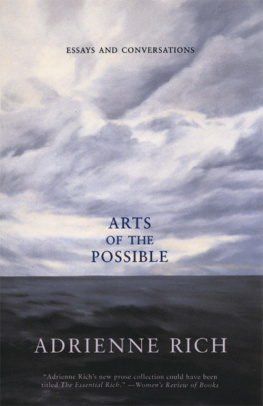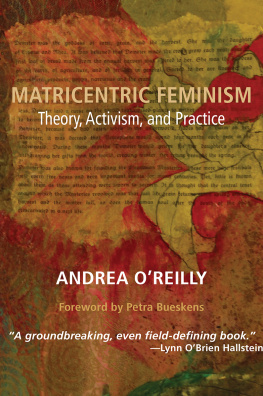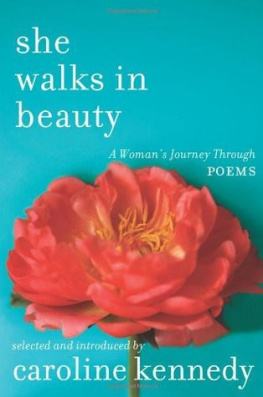
Copyright 1986, 1976 by W. W. Norton & Company, Inc. All rights reserved. Grateful acknowledgment is made for permission to quote from the following: Conditions. From On the Crevices of Anger by Nellie Wong in Conditions, 3:52-57. Reprinted by permission. Lilly Engler. From the Third Elegy of the Duino Elegies, by Rainer Maria Rilke, translated by Lilly Engler. Reprinted by permission of the translator. Harper & Row. From Mother and Child in Like the Iris of an Eye by Susan Griffin. Copyright by Susan Griffin. Reprinted by permission of Harper & Row, Publishers, Inc., and the author. Hoosier Folklore. From The Hanging of Sam Archer, a folk poem reported, with music, in Hoosier Folklore, 5 (1946). Reprinted by permission. Edite Kroll. The Child, Part 4 of The Network of the Imaginary Mother, copyright 1976 by Robin Morgan. Reprinted from Lady of the Beasts by Robin Morgan, by permission of the author % Edite Kroll. David Meltzer. From Birth, by David Meltzer, a verse translated by John A. Wilson. Reprinted by permission of the author and North Point Press. W. W. Norton & Company, Inc. From There Are No Honest Poems About Dead Women in Our Dead Behind Us by Audre Lorde. Copyright 1986 by W. W. Norton. Reprinted by permission. Sue Silvermarie. From To a Boy-Child, by Sue Silvermarie, which appeared in Women: A Journal of Liberation. Copyright 1974. Reprinted by permission. Sinister Wisdom Books. From A Gathering of Spirit: Writing and Art by North American Indian Women edited by Beth Brant, Sinister Wisdom Books, Montpelier, VT, 1984. Reprinted by permission. Times Change Press. From a poem by Alta that appeared in Momma: A Start on all the Untold Stories, pp. 72-73, copyright 1974 by Times Change Press. Reprinted by permission of the publisher and the author.
Norton paperback edition published 1986; reissued 1995
The Library of Congress has cataloged the printed edition as follows:
Rich, Adrienne.
Of woman born.
Includes index.
1. Motherhood. 2. Mother and child. 3. Feminism
I. Title.
HQ759.R53 1986 306.8743 86-12687
ISBN 978-0-393-31284-3
ISBN 978-0-393-34810-1 (e-book)
W. W. Norton & Company, Inc.
500 Fifth Avenue, New York, N.Y. 10110
www.wwnorton.com
W. W. Norton & Company Ltd.
Castle House, 75/76 Wells Street, London WIT 3QT
To my grandmothers
Mary Gravely Hattie Rice
whose lives I begin to imagine
and to the activists
working to free womens bodies
from archaic and unnecessary bonds
ADRIENNE RICH
OF WOMAN
BORN MOTHERHOOD AS
EXPERIENCE AND INSTITUTION
W W NORTON & COMPANYNew York London
... there are ways of thinking that we dont know about. Nothing could be more important or precious than that knowledge, however unborn. The sense of urgency, the spiritual restlessness it engenders, cannot be appeased...
Susan Son tag, Styles of Radical Will
But what do we do with our lives? There are growing, collective efforts to meet the institution of motherhood head-on, for example, the National Welfare Rights Organization, the National Abortion Rights Action League, and numerous special groups such as Catholics For A Free Choice, the Sisterhood of Black Single Mothers in New York, and the Lesbian Mothers National Defense Fund, based in Seattle. A national organization, MOMMA, with a newspaper and chapters throughout the country, addresses itself to the problems of single mothers in general
In the four years of writing this book I have seen the issue of motherhood grow from a question almost incidental in feminist analysis to a theme which now seems to possess the collective consciousness of thoughtful women, whether as mothers, as daughters, or both. Various writers have called for a new matriarchalism; for the taking over by women of genetic technology; for the insistence on child-care as a political commitment by all members of a community or by all child-free women; communal child-raising; the return to a village concept of community in which children could be integrated into the adult life of work; the rearing of children in feminist enclaves to grow up free of gender-imprinting. There is a ripple of interest in new fatherhood, in the establishing of a basis of proof that men, as well as women, can and should mother, or for redefinitions of fatherhood which would require a more active, continuous presence with the child.
To seek visions, to dream dreams, is essential, and it is also essential to try new ways of living, to make room for serious experimentation, to respect the effort even where it fails. At the same time, in the light of most womens lives as they are now having to be lived, it can seem naive and self-indulgent to spin forth matriarchal utopias, to demand that the technologies of contraception and genetics be turned over to women (by whom, and under what kinds of effective pressure?); to talk of impressing unchilded women into child-care as a political duty, of boycotting patriarchal institutions, of the commune as a solution for child-rearing. Child-care as enforced servitude, or performed out of guilt, has been all too bitter a strain in our history. If women boycott the laboratories and libraries of scientific institutions (to which we have barely begun to gain access) we will not even know what research and technology is vital to the control of our bodies.and of itself, has no special magic for women, any more than has the extended family or the public day-care center. Above all, such measures fail to recognize the full complexity and political significance of the womans body, the full spectrum of power and powerlessness it represents, of which motherhood is simply onethough a crucialpart.
Furthermore, it can be dangerously simplistic to fix upon nurturance as a special strength of women, which need only be released into the larger society to create a new human order. Whatever our organic or developed gift for nurture, it has often been turned into a boomerang. About women political prisoners under torture, Rose Styron writes:
The imagination, the emotionalism a woman is classically assignedthe passion she has developed defending her children, the compassion (or insight into human motive and possibility) she has acquired being alert to the needs and demands of her family or communitycan make her into a fierce opponent for her tormentors. It can also make her exceptionally vulnerable (Emphasis mine).
This has been true for women in general under patriarchy, whether our opponents are individual men, the welfare system, the medical and psychoanalytic establishments, or the organized network of drug traffic, pornography, and prostitution. When an individual woman first opposes the institution of motherhood she often has to oppose it in the person of a man, the father of her child, toward whom she may feel love, compassion, friendship, as well as resentment, anger, fear, or guilt. The maternal or nurturant spirit we want to oppose to rapism and the warrior mentality can prove a liability so long as it remains a lever by which women can be controlled through what is most generous and sensitive in us. Theories of female power and female ascendancy must reckon fully with the ambiguities of our being, and with the continuum of our consciousness, the potentialities for both creative and destructive energy in each of us.
I am convinced that there are ways of thinking that we dont yet know about. I take those words to mean that many women are even now thinking in ways which traditional intellection denies, decries, or is unable to grasp. Thinking is an active, fluid, expanding process; intellection, knowing are recapitulations of past processes. In arguing that we have by no means yet explored or understood our biological grounding, the miracle and paradox of the female body and its spiritual and political meanings, I am really asking whether women cannot begin, at last, to
Next page
